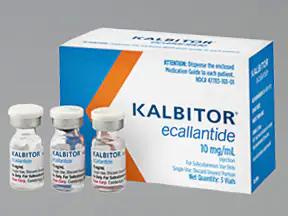Ecallantide Interactions
No drug interactions were found for ecallantide. However, this does not necessarily mean no interactions exist. Always consult your healthcare provider.
Ecallantide is in the drug class hereditary angioedema agents. Ecallantide is used for Hereditary Angioedema.
More about ecallantide
- ecallantide consumer information
- Compare alternatives
- Reviews (2)
- Side effects
- Dosage information
- During pregnancy
- Drug class: hereditary angioedema agents
- Breastfeeding
- En español
Related treatment guides
Drug Interaction Classification
| Highly clinically significant. Avoid combinations; the risk of the interaction outweighs the benefit. | |
| Moderately clinically significant. Usually avoid combinations; use it only under special circumstances. | |
| Minimally clinically significant. Minimize risk; assess risk and consider an alternative drug, take steps to circumvent the interaction risk and/or institute a monitoring plan. | |
| No interaction information available. |
See also:
Berinert
Berinert is used to treat acute abdominal, facial, or laryngeal hereditary angioedema (HAE) attacks ...
Kalbitor
Kalbitor injection is used to treat acute attacks of hereditary angioedema (HAE) in patients 12 ...
Orladeyo
Orladeyo (berotralstat) is used to prevent attacks of hereditary angioedema (HAE). Includes ...
Haegarda
Haegarda is an injectable protein replacement therapy that prevents swelling and attacks in ...
Takhzyro
Takhzyro (lanadelumab-flyo) is used to prevent hereditary angioedema (HAE) and reduce symptoms ...
Andembry
Andembry is used to prevent attacks of Hereditary Angioedema (HAE) in adults and children 12 years ...
Ruconest
Ruconest is used to treat angioedema attacks in adult and adolescent patients with Hereditary ...
Firazyr
Firazyr is used for hereditary angioedema (HAE) to treat acute HAE attacks in adults 18 years and ...
Cinryze
Cinryze (complement C1 esterase inhibitor) is used to prevent attacks of angioedema in people with ...
Stanozolol
Stanozolol is used in the treatment of hereditary angioedema, which causes episodes of swelling of ...
Further information
Always consult your healthcare provider to ensure the information displayed on this page applies to your personal circumstances.


